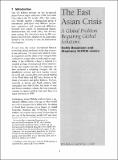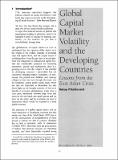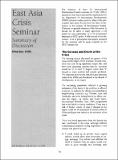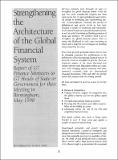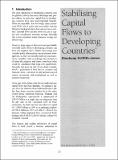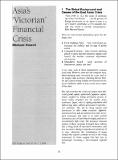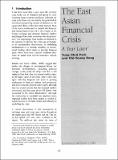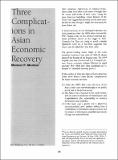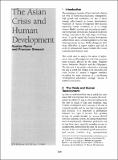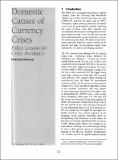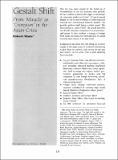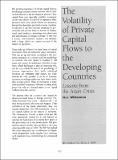Volume 30, Issue 1: East Asia: What Happened to the Development Miracle?
Browse by
Recent Submissions
-
The East Asian Crisis: A Global Problem Requiring Global Solutions
(Institute of Development Studies, 01/01/1999) -
Global Capital Market Volatility and the Developing Countries: Lessons from the East Asian Crisis
(Institute of Development Studies, 01/01/1999)Summary The emerging global economy is characterised by the virtually free movement of capital, while labour is still essentially confined to the nation state. The East Asian crisis has revealed the extent to which ... -
East Asia Crisis Seminar: Summary of Discussion
(Institute of Development Studies, 01/01/1999) -
Strengthening the Architecture of the Global Financial System:
(Institute of Development Studies, 01/01/1999)Summary More timely and accurate information on countries' economic situations – in particular on foreign reserves – is required for proper risk assessment. Capital account liberalisation can bring benefits but needs to ... -
Stabilising Capital Flows to Developing Countries
(Institute of Development Studies, 01/01/1999)Summary The East Asian financial crisis is linked to volatile short?term capital flows. Restrictions on short?term inflows should be contemplated to cope with large surges in these capital flows. There is also a need to ... -
“If You Want to Get Somewhere Else, You Must Run at Least Twice as Fast as That!”: The Roots of the East Asian Crisis
(Institute of Development Studies, 01/01/1999)Summary Most East Asian economies have been following growth trajectories which involve ever?intensifying competition in external product markets. The financial crisis of 1997–98, whilst clearly having roots in the ... -
Asia's ‘Victorian’ Financial Crisis
(Institute of Development Studies, 01/01/1999)Summary Like the European economic crises of the nineteenth and early twentieth centuries, the crisis in East Asia is essentially an overproduction crisis. As in other such episodes, the East Asian case was characterised ... -
The East Asian Financial Crisis: A Year Later
(Institute of Development Studies, 01/01/1999)Summary Park and Song argue that the capital inflow into Southeast Asia was driven by foreign investors. The maturity structure of foreign denominated liabilities shortened in the wake of mounting problems in export ... -
Three Complications in Asian Economic Recovery
(Institute of Development Studies, 01/01/1999)Summary Three features in the Asian economic crisis complicate recovery. First, because the crisis is centred in the private sector, the recognition and workout of losses, especially on the part of stock?holders of financial ... -
The Asian Crisis and Human Development
(Institute of Development Studies, 01/01/1999)Summary The article analyses from a Human Development perspective the adjustment process in five Asian countries seriously affected by the crisis. The previous impressive record in improving human development was due to ... -
Domestic Causes of Currency Crises: Policy Lessons for Crisis Avoidance
(Institute of Development Studies, 01/01/1999)Summary Reisen stresses that domestic causes of currency crises can be endogenous to the international financial system. Net capital transfers imply current account deficits on the recipient side. Sustained capital inflows ... -
Gestalt Shift: From ‘Miracle’ to ‘Cronyism’ in the Asian Crisis
(Institute of Development Studies, 01/01/1999)Summary Crisis explanations focussing on either domestic vulnerabilities or moral hazard do not seem to cover the Asian crisis well, while hypotheses focussing on investor panic appear to be more consistent with the ... -
The Volatility of Private Capital Flows to the Developing Countries: Lessons from the Asian Crisis
(Institute of Development Studies, 01/01/1999)Summary Eurodollar markets have a decisive role in creating liquidity, which contributed to overinvestment in emerging economies. IMF responses to the situation failed to prevent currency crises but there may be some ...

